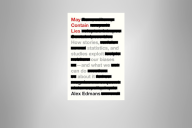You have /5 articles left.
Sign up for a free account or log in.
This year is the 50th anniversary of Anti-Intellectualism in American Life by Richard Hofstadter, whose greatest achievement, someone once said, was keeping it to just the one volume.
As discussed here a short while ago, the revisionist interpretation of American populism appearing in Hofstadter’s book The Age of Reform (1955) has taken a lot of positivistic hits by subsequent historians. He over-generalized on the basis of a (very) narrowly selected pool of primary sources -- and in the final analysis, he wasn’t really writing about the 1890s at all, but rather his own times, equating the mood and worldview of McCarthyism with the agrarian radicals of the People’s Party. Hofstadter was more conscious of the pressure of contemporary affairs in Anti-Intellectualism, which he wrote was “conceived in response to the political and intellectual conditions of the 1950s.”
It was “by no means a formal history,” Hofstadter wrote, “but largely a personal book, whose factual details are organized and dominated by my views.” I take that to be a concession, of sorts, to historians who were finding The Age of Reform problematic. His strength was the essay more than the monograph. A passage such as the following is remarkable for – among other things -- how its urbane diction just barely subdues the remembered experience of dread:
“Of course, intellectuals were not the only targets of McCarthy’s constant detonations -- he was after bigger game -- but intellectuals were in the line of fire, and it seemed to give special rejoicing to his followers when they were hit. His sorties against intellectuals and universities were emulated throughout the country by a host of less exalted inquisitors.”
It is also remarkable for needing only the slightest change of wording to sound uncomfortably applicable to more recent events. The problem lies not with this or that demagogue but with something deeper. Hofstadter spent 400 pages sounding it out. But the American science and science-fiction writer Isaac Asimov condensed it into one sentence of a column for Newsweek in 1980: “The strain of anti-intellectualism has been a constant thread winding its way through our political and cultural life, nurtured by the false notion that democracy means that ‘my ignorance is just as good as your knowledge.’ ”
Neither as broad in historical scope as Anti-Intellectualism in American Life nor as trenchant as Asimov’s zinger, Aaron Lecklider’s Inventing the Egghead: The Battle Over Brainpower in American Culture (University of Pennsylvania Press) is explicitly framed as a response to another decade – the ‘00s. While challenging Hofstadter’s ideas, Lecklider, an assistant professor of American studies at the University of Massachusetts Boston, follows his lead in responding to a past that, while recent, somehow already seems distinctly periodized.
It was the worst of time, full stop. Figures in the Bush administration were openly contemptuous of “experts,” with all their “knowledge” about “reality.” The Bush-bashers called the president stupid, and his supporters called the Bush-bashers stupid, and there was a TV game show called “Are You Smarter Than a Fifth Grader?” which hinted that the whole country was stupid, and that’s O.K. (It did well in the ratings.) The culture war was fought with the bluntest of weapons -- not between the intelligentsia and the ignorati, but between anti-intellectuals and anti-anti-intellectuals. The latter expression, while clumsy at best, acknowledges something important: anti-anti-intellectual ≠ intellectual. Laughing at a satirical interview with a creationist on “The Daily Show” entails no substantial engagement with the life of the mind.
Much of the edifying conflict was fought out in popular culture and the mass media – terrain that, Lecklider argues, historians and social critics of Hofstadter’s era either neglected, at best, or regarded as stupefying and regressive. Hence their interpretations of American cultural history tended to be narratives of decline.
In reply, Inventing the Egghead presents a series of case studies from the first six decades of the 20th century in which conflicts over the power and the possession of intellectual capital were fought out in a wide range of popular venues: cartoons, movies, jokes, Tin Pan Alley songs, newsmagazines, posters, popular science journals, handbooks on efficient housekeeping, etc.
The chapters proceed chronologically, from the rechristening of a Coney Island park in 1909 as an institute of science (to skirt blue laws) to Einstein as cult figure, to aspects of the Harlem Renaissance and the New Deal “brain trust,” and on up to the stress-inducing utopia of Oak Ridge and the coining of “egghead” as pejorative. The effect is one of cultural history as collage. Running through all these topics and cultural forms is an uneasy and constantly shifting set of attitudes towards what Lecklider calls “brainpower.”
In the author’s usage “brainpower” means the power to acquire or to stake a claim to knowledge and expertise, whether respected and professionally credentialed or not. Conflicts over who possesses brainpower (and who doesn’t) are continuous. So are disputes over its value and limitations. And that flux comes, in part, from the frequently changing needs of an economy that requires technological advances as well as a steady supply of human brains, serviceable as a factor of production.
In short, there were grounds for ambivalence about brainpower -- for reasons more various and complex than some notion of an unchanging American cultural disposition toward anti-intellectualism. “Competing representations of intelligence” in popular culture, Lecklider writes, “could alternately smash the pretensions of an intellectual elite, position ordinary men and women as smarter than experts, appeal to intellectual culture to validate working-class positions, and dismantle intellectual hierarchies. These representations were often uncomfortable and contradictory, sometimes even self-defeating, particularly when the value of intelligence was diminished in order to level the intellectual playing field.”
But other strains of popular culture – a number of distinctively WPA-era posters promoting libraries, for example -- served to recognize and foster peoples’ self-respect regarding their own mental capacities.
Earlier I suggested that “Are You Smarter Than a Fifth Grader?” implied the viewer probably wasn’t. On reflection, that may have been too dour a view. Perhaps the title gives the viewer something to which to aspire. Be that as it may, in the representations of brainpower that Lecklider inspects, the expressions of ambivalence tend more often to have more hostility or disparagement in the mix than respect for self or others. While written, and blurbed, as an alternative to Anti-Intellectualism in American Life, the book ends up seeming like the extensive elaboration and updating of a point Hofstadter made there in passing: "As the demand for the rights of the common man took form in 19th-century America, it included a program for free elementary education, but it also carried with it a dark and sullen suspicion of high culture, as a creation of the enemy."
Some people will bristle at the expression "high culture." They always do. (I'm not overly fond of it.) But that response misses the point, which, again, was put quite plainly by Isaac Asimov a while back. "I believe that every human being with a physically normal brain can learn a great deal and can be surprisingly intellectual," he wrote. "I believe that what we badly need is social approval of learning and social rewards for learning." That is as cheerful a face as can be put on our situation.








